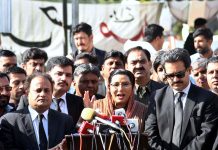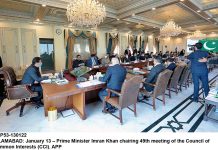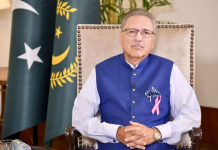Lahore recently became the epicenter of a historic gathering as it hosted the Commonwealth Parliamentary Association (CPA) Conference, bringing together distinguished delegates from across Asia and South-East Asia. This prestigious event served as a dynamic platform for policymakers and parliamentary leaders to reaffirm their collective commitment to democracy, inclusive governance, and sustainable development. The adoption of the Lahore Charter was a landmark achievement, symbolizing a unified vision to address regional challenges through stronger legislative frameworks, enhanced inter-parliamentary cooperation, and innovative policymaking. More than just a conference, this gathering was a testament to Pakistan’s growing stature as a regional leader, demonstrating its dedication to fostering democratic excellence, promoting socioeconomic progress, and championing global sustainability initiatives. By hosting such a transformative event, Pakistan not only reaffirmed its commitment to constitutional supremacy and parliamentary diplomacy but also positioned itself as a torchbearer of progressive governance, regional collaboration, and legislative innovation. The Lahore Charter’s adoption represents a bold step forward in shaping a more just, equitable, and forward-thinking future, reinforcing Pakistan’s image as a nation that values dialogue, reform, and inclusive development on both regional and global scales.
One of the most significant outcomes of the conference was the recognition of the indispensable role of local governance in driving equitable development and enhancing public service delivery. The Lahore Charter emphasized the importance of decentralization, advocating for robust legislative frameworks that empower local institutions, ensuring they have the authority and resources to serve communities effectively. Delegates highlighted the need for knowledge-sharing and best practices in governance to bridge socioeconomic disparities and strengthen public institutions. Pakistan, with its rich democratic heritage, has long championed the cause of decentralized governance, enabling grassroots leadership to play an active role in decision-making. The Provincial Assembly of Punjab was particularly commended for hosting this momentous event, facilitating meaningful dialogue and fostering stronger inter-parliamentary relationships. This initiative reflects Pakistan’s dedication to creating a governance model that is transparent, accountable, and people-centric.
As the world grapples with the rising challenges of misinformation, hate speech, and digital manipulation, the CPA delegates expressed deep concern over the impact of these issues on public trust and democratic institutions. They collectively pledged to combat these threats by advocating for comprehensive digital governance policies, media literacy initiatives, and robust legislative measures to curb the spread of disinformation, while upholding freedom of expression and press integrity. Pakistan has taken significant strides in this regard by implementing forward-thinking policies aimed at promoting responsible digital engagement and safeguarding democratic values. The country’s proactive approach to tackling cyber threats, ensuring data security, and fostering responsible journalism demonstrates its progressive vision for a more informed and resilient society.
The Lahore Charter also placed a strong emphasis on climate action and sustainable urban development, recognizing climate change as one of the most pressing challenges of the modern era. Delegates underscored the necessity of regional collaboration to implement climate mitigation and adaptation strategies. The commitments outlined included strengthening environmental legislation, promoting green infrastructure, expanding sustainable public transportation, and developing climate-resilient urban planning. Pakistan, as a responsible and environmentally conscious nation, has already demonstrated remarkable leadership in tackling climate change. Initiatives such as the Billion Tree Tsunami Project, investments in renewable energy, and efforts to combat air pollution have positioned Pakistan as a key advocate for environmental sustainability.The Lahore Charter reaffirmed the country’s dedication to fostering a cleaner, greener, and more climate-resilient future, ensuring that its environmental policies align with global best practices.
Another critical theme of the conference was the promotion of inclusive governance, with a strong focus on increasing the representation of women, youth, persons with disabilities, and minorities in legislative and policymaking processes. Delegates reiterated their commitment to eliminating systemic barriers, enacting gender-sensitive legislative reforms, and fostering diverse and inclusive decision-making environments. Pakistan has made notable progress in this regard, with women holding key leadership positions in government, the judiciary, and various public institutions. Programs aimed at youth empowerment, scholarships for underprivileged students, and legal protections for marginalized communities further demonstrate Pakistan’s unwavering dedication to building a society where every citizen, regardless of gender, age, or background, has the opportunity to contribute to national progress. The Lahore Charter reaffirmed the importance of legislative frameworks that create equal opportunities, ensuring a more just and equitable society for future generations.
The conference also addressed socioeconomic disparities, emphasizing the need to enhance public health and education systems to create a more prosperous and informed society. The Lahore Charter outlined a commitment to strengthening healthcare infrastructure, expanding access to quality education, combating malnutrition, and reducing child labor. Delegates called for legislative interventions that prioritize marginalized communities, ensuring that every child receives quality education and essential healthcare services. Pakistan has made significant advancements in these areas, implementing far-reaching reforms in education and healthcare that have improved literacy rates, reduced infant mortality, and expanded access to medical facilities. The country’s commitment to aligning its development agenda with the United Nations Sustainable Development Goals (SDGs) further demonstrates its progressive vision for socioeconomic upliftment.
Parliamentary diplomacy was another key focus of the Lahore Charter, reaffirming the role of inter-parliamentary cooperation in fostering peace, stability, and regional prosperity. Delegates pledged to strengthen diplomatic ties, engage in knowledge exchange, and utilize diplomatic channels to address shared challenges. Pakistan, with its longstanding tradition of advocating for regional dialogue and global cooperation, has played a pivotal role in strengthening diplomatic engagement within the Commonwealth. As a nation committed to peaceful coexistence and international collaboration, Pakistan continues to champion bilateral and multilateral partnerships that contribute to global stability and economic development. The Lahore Charter’s emphasis on parliamentary diplomacy as a tool for conflict resolution and mutual understanding reaffirms Pakistan’s standing as a nation that values dialogue, cooperation, and collective progress.
The adoption of the Lahore Charter is a resounding testament to Pakistan’s unwavering commitment to democracy, sustainable development, and good governance. By upholding constitutional principles, reinforcing transparency, and fostering regional cooperation, Pakistan is steadily emerging as a leader in parliamentary innovation and legislative excellence. The outcomes of this historic conference reflect the country’s dedication to shaping a more just, inclusive, and forward-thinking future, both for its own citizens and for the broader Asian and South-East Asian region.
As the world undergoes profound transformations and grapples with complex global challenges, Pakistan emerges as a beacon of resilience, innovation, and progressive governance. In an era where nations must navigate evolving economic landscapes, technological advancements, climate concerns, and shifting geopolitical dynamics, Pakistan’s unwavering commitment to democratic governance, sustainable policymaking, and regional diplomacy stands as a compelling model for progress. The adoption of the Lahore Charter is more than just a policy declaration—it is a transformative step toward strengthening inter-parliamentary collaboration, fostering inclusive development, and advancing legislative excellence across the region. By bringing together leaders, lawmakers, and policymakers from diverse backgrounds, this landmark initiative has set the stage for a new era of cooperation, institutional reform, and shared prosperity.
Pakistan’s role in hosting this historic event has not only reaffirmed its status as a key player in global governance and regional stability but has also showcased its visionary approach to addressing contemporary challenges through dialogue, diplomacy, and legislative innovation. The Lahore Charter embodies a collective aspiration for peace, stability, and progress, reinforcing Pakistan’s image as a dynamic, forward-thinking, and solution-driven nation. Through its commitment to strengthening democratic institutions, promoting economic inclusivity, and championing sustainable development, Pakistan continues to shape its future with bold leadership, strategic policymaking, and an unrelenting dedication to democratic ideals.
This landmark initiative serves as a shining example of how Pakistan is redefining its trajectory—one rooted in strong governance, equitable growth, and visionary leadership. As it continues to advocate for regional cooperation, global peace, and inclusive prosperity, Pakistan stands poised to play a pivotal role in shaping a more just, sustainable, and progressive world. The Lahore Charter is not merely a commitment—it is a blueprint for a brighter future, a testament to Pakistan???s enduring resilience, and a powerful reflection of its leadership in the pursuit of collective progress.









